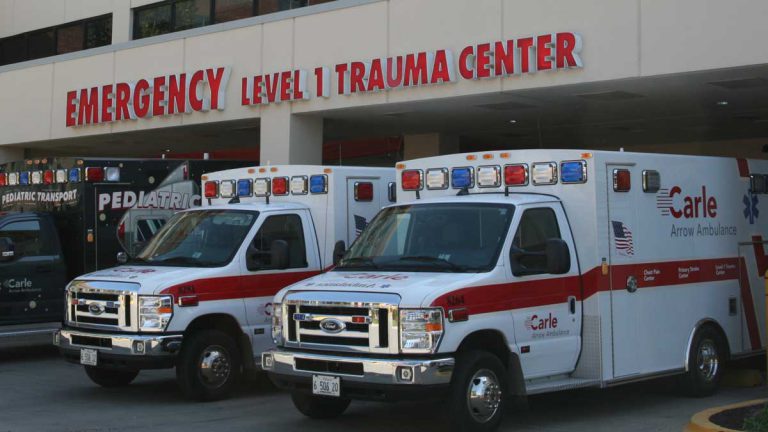URBANA – In some parts of Illinois, the percentage of available intensive care beds has dropped below 20% as the number of COVID hospitalizations has risen over the past month.
State data shows the southernmost region of Illinois has only 5% of ICU capacity available. A region in the northwest part of Illinois has about 14%, and in a 21-county region in east-central Illinois, ICU capacity stands at just over 20%.
But some intensive care units — including Carle Foundation Hospital in Urbana — are already nearly full. That’s according to Dr. Vishesh Paul, a pulmonary critical care doctor at Carle.
Nationwide, CDC data shows the vast majority of people who are getting hospitalized are unvaccinated — and Paul says he’s seeing the same trend at Carle.
“We are seeing breakthrough cases in vaccinated [people], but more than 90%, I would say, are mild cases, like cold symptoms or requiring a little oxygen. And they recover fast,” he says. “Patients who are unvaccinated [and] have other medical conditions — like diabetes and obesity — they are the sickest and it just feels bad to see them going down rapidly.”
Paul says Carle is planning to open surge units and pull in staff from other specialities to help with the influx of COVID patients.
“There are some other specialties – internal medicine, hospitalists, palliative care – who can handle certain aspects of care of these critically ill patients,” Paul says. “So we have that backup ready in case we need to use them.”
The recent uptick in COVID hospitalizations is frustrating because, with the vaccine now widely available, it’s a “preventable problem,” Paul says.
Patients who are unable to find a hospital bed in areas as far away as St. Louis or parts of Indiana have been arriving recently for care at Carle, he says.
“Everybody is working tirelessly,” Paul says. “Our teams are working day and night tirelessly to take care of patients, anybody who walks through the doors or is transferred from another hospital.”
At OSF Heart of Mary Medical Center, the situation is not as dire, but staff are concerned about the increase in COVID hospitalizations, says critical care nurse Gabby Williams who works in the ICU.
“We still have beds, we’re not completely full,” Williams says. “But it’s pretty serious.”
Williams says she and her colleagues had enjoyed a period of calm earlier this summer. The hospital was able to loosen certain guidelines, such as the ban on visitors.
“COVID patients started having family members that could visit, and so that was really nice,” she says. “And I thought we were going to start to get back to normal. But because we’re having an increase in cases, we’re having to lock back down.”
The past 18 months have been challenging both physically and emotionally. Williams, who works in both the ICU and with the ambulance unit, sees patients in the early stages of their illness.
“Then I come here in the critical care unit and I get to watch the progression,” she says. “Some people I get to see get better. Some people don’t always have such a happy outcome.”
Williams encourages people who are still on the fence about the vaccine to speak with a doctor about their concerns and seek out reliable sources of information.
Paul says he didn’t expect hospitals would again get to the point of needing to cancel elective procedures and executing plans to expand ICU capacity.
“I thought it wouldn’t happen,” Paul says. “I thought with vaccination, we can control this thing. We are urging everybody to get vaccinated so hopefully we can control this pandemic in the near future.”
For a look at which U.S. hospitals are getting overwhelmed by COVID-19 patients, check out NPR’s interactive map.
Christine Herman is a reporter at Illinois Public Media. Follow her on Twitter: @CTHerman

